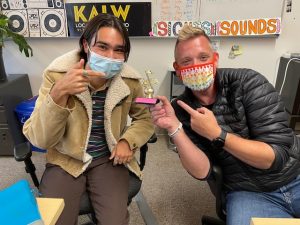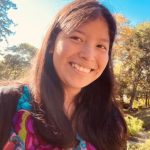ACE Spectrum
ACE Spectrum
Ace Spectrum is about you — the ACE Learning Centers.
It’s a quick sharing of ideas, inspiration, opinions and best practices among our continuing education organizations.
Please join the conversation.
KALW Audio Academy Success Stories Continue
By Shereen Adel, Editorial Operations, KALW News and Christopher Beale (‘21), Summer Trainee
We’re about a third of the way through our 9-month Audio Academy. Our fellows are hard at work on their very first radio features.
While they plug away at that, we have some news from alumni who were in past Audio Academy and summer programs.
Audio Academy alum Mary Goode (’14) sent us a note saying:
I’ve returned to journalism after a big break and am doing feature stories for radio and newspapers from Europe. And what I’m finding is that I refer back to my KALW days and storytelling training every day I’m writing. It really helped me to craft a story better — even for newspaper. So, I wanted to say hi, and thanks!
Audio Academy alum Wren Farrell (‘21) is now an associate producer with All Ears, a podcast from Fork Films.
And summer trainee Christopher Beale (‘21) had one of his stories air on Snap Judgment, subbed in for the host of KQED’s The Bay, and launched his very own podcast Stereotypes.
Here’s what he had to say about being in our program:
Before KALW I had a collection of miscellaneous skills and no idea how to focus them.
I spent 20 years as a commercial radio personality and through that learned a ton about audio production, but not much about being a journalist. I moved to San Francisco to become a public radio producer and journalist and I’m pleased to say that I did just that. KALW was at the center of the journey.
I interviewed for the KALW Summer Journalism Program with Hana Baba (host of Crosscurrents) and was soon accepted into the first internship of my life — at 38 years old. The team at KALW has a streamlined and intensive program designed to turn you into a working reporter in a matter of weeks. My love of sound-rich work was encouraged and many of my news spots contained field recordings.
I received one-on-one instruction from experienced educators and editors, networking opportunities with people at NPR, and my first story on the air, all in the first weeks. Through the detailed, hand-on instruction I received at KALW I was able to focus my skills and now have a much clearer path to the career I want. Today I am freelancing, hosting/producing a queer audio stories podcast called Stereotypes and working regularly as a reporter/producer for KQED.
Stay tuned in January to hear more from our Audio Academy class of 2022.
From Government Studies to Boxing, Returning to School Helps OIHS Student “Learn Better”
A conversation between Ronaldo, Oakland International High School student, and Martha Sessums, President, ACE
The virtual learning school year of 2019/2020 was tough for Ronaldo, now a junior at Oakland International High School (OIHS). He arrived from Guatemala as a teen and learned English, made friends and began appreciating learning and his teachers. But like many students, he spent a year in virtual classes because of the pandemic and it was a tough learning experience.
“I didn’t learn too much because, you know, it’s different in person,” Ronaldo said. “They teach you and show you what you have to do, but in Zoom you just sit at the computer and it was difficult. It’s not the same as in person.”
Ronaldo had a space at home for his computer and attending classes. His family supported him in school, but he also worked at a restaurant after school, and still does. His sister also was home and learning virtually in her space. But he prefers being in the actual school community.
“It was really nice to come back to see your friends in person, have conversations in person and just wear a mask,” he laughed. “It’s still important to keep safe.”
The personal part of learning for Ronaldo wasn’t just about being and talking with friends. It was also about how he worked with his OIHS teachers and learned.
“I like the way they teach students here,” Ronaldo said. “They teach you more specifically here, try to help you to learn to be better, to learn better, make your English better. In the other school I went to they just showed you how to write . . . and didn’t ask if you understood or needed help again to understand this. They do that here. Not just for me but for all students.”
Ronaldo has a few favorite school topics including current government history and discussions about political points-of-view and how things are decided from a philosophical angle. He participated in a debate on who should make the rules – students or teachers – and enjoyed the discussion, making key points and the process of listening to one another. There was no winner, just an enjoyment of and learning from the process.
“We are the same, you know,” he said. “Always the same.”
A new topic he is learning is taking pictures with digital single lens reflex (DSLR) cameras and making videos. He is learning to take pictures with these larger cameras that are very different than a quick snap on a mobile phone. He is also going to learn movie making skills and will create a movie for a group project in his Film Production class. When I talked to him, the topic had not been decided yet, but he will learn about telling a story in flowing pictures.
What would Ronaldo like to do when he graduates? “Become a boxer,” he says. He has learned boxing from friends and OIHS hopes to offer an after-school boxing program soon. He has watched many videos on boxing and likes the exercise. It is also a way to make money.
“I have a friend who started boxing for two years and I was helping him,” Ronaldo said. “His first fight was in Las Vegas. He lost and you could see it in all his face, but he wanted to keep going.”
Ronaldo isn’t ready for Vegas yet but he wants to spend a couple of years learning the skills so he can pursue that dream.
But one can have a couple of possible career paths open, especially in high school where students explore lots of options. Ronaldo’s parents are encouraging him to attend college like his sister is doing, but he is not sure.
“I’m not sure I want to go to college, but they (my parents and others) tell me you have to go, it’s more better for your future,” he said.
But if Ronaldo did attend college, it could be for learning a new skill set at a trade school or vocational college.
“I was actually thinking of becoming a plumber, he said. “I could go for two years to college and learn the training. Plumbers make a lot of money.”
Fortunately, Laney College, which is part of the Peralta Colleges, offers many vocational programs like Plumber Training. The Plumber Training program prepares students for plumbing careers by orienting students to basic plumber work, tools and equipment. It also includes construction development which requires math and pre-algebra. Sorry, Ronaldo. Math counts even in plumbing.
Ronaldo started working at a Mexican restaurant after school to help with his family’s finances for 2020 and is evidently doing it so well that the restaurant is training him to become a manager. Another career path.
Ronaldo’s advice to incoming OIHS students is to read books, especially history. He enjoys the inspiration from leaders such as Martin Luther King. Although the hardest thing he deals with now is the balance between school time, work time and getting the homework done, he is glad to be at OIHS and focusing on school.
Whether it’s boxing, becoming a plumber or a restaurant manager (maybe owner) or something else, I suspect Ronaldo will smartly punch his way to success, even in these difficult times.
“Become Wise” is Goal of OIHS Student as She Transitions Back to In-Person Learning
A conversation between Yosili, Oakland International High School student, and Martha Sessums, President, ACE
The school year 2019/2020 was hard for Yosili, as it was for many students. She immigrated from Guatemala three years ago and entered Oakland International High School (OIHS) in the ninth grade. She is now in her last year of high school and happy to be back to in-person learning.
“I learn more when I’m in school,” Yosili said. “I also had issues with internet set-up, so it was difficult.”
There were some aspects that were positive in her virtual learning year. No more hour commute to school and more time at home to help her mom who had lost her job. Yosili worked after her virtual school classes (and homework) at both UPS and Jack in the Box to help with family income and her work hours sometimes went late into the night.
Returning to school this year changed everything. She quit the restaurant job and works at UPS for only three days because she still must help support herself and her mom. Yosili is enjoying being back with friends and taking classes that will help her enter college, including math and English classes. These are the dual-enrollment community college classes that Yosili is taking. ACE supports these efforts to create that bridge into community college with support classes for both college English and Trigonometry that are embedded into the school day. Yosili has taken advantage of these offerings in the past and continues to do so by taking Trigonometry this year.
“I take all those extra math, geometry and English grammar classes,” she said. “I take math and English because I’m earning grades for college and I’m also learning.”
A part of that learning is joining student government and Latina clubs.
“Student government is important to me because I learn how to manage my time, how to be a leader and how to make change to help our schools,” Yosili said. “The Latina club is where I make friends and we help each other and give advice to each other. We also do crafts like friendship bracelets.”
But the math classes are key for Yosili.
“The math classes are very important because I want to become wise,” she said. “Math is outside my experience, but it helps me solve problems. I also want to help other students with homework, asking questions and solving problems. I want to learn stuff and how to solve problems so I can become wise.”
Yosili also likes the many student clubs that are offered by OIHS, such as music, soccer or basketball, which let students support and expand their interests beyond just studying. Plus, it lets her “be social and have good friends.”
As a senior, Yosili is applying to colleges. She wants to become a nurse, so she is thinking about researching UC Davis. The OIHS counselors are working with her to find the right college and help her with applications and student loans.
What does Yosili’s mom think about her spending more time with schooling and entering college?
“It’s just me and my mom, but if I want to study, it’s okay,” Yosili said. “Like every mom, she wants the best for her child and if I want to go to college, she will support me completely.”
What advice does Yosili give other OIHS students who are also having to transition back to in-school learning?
“Focus on school and make the best choices you can,” she said. “I would like to be in all the clubs, but I don’t have the time because I have to work. But I encourage students to join clubs, meet people, learn, improve their skills and knowledge and build community.”
Wise advice. Thank you, Yosili.



